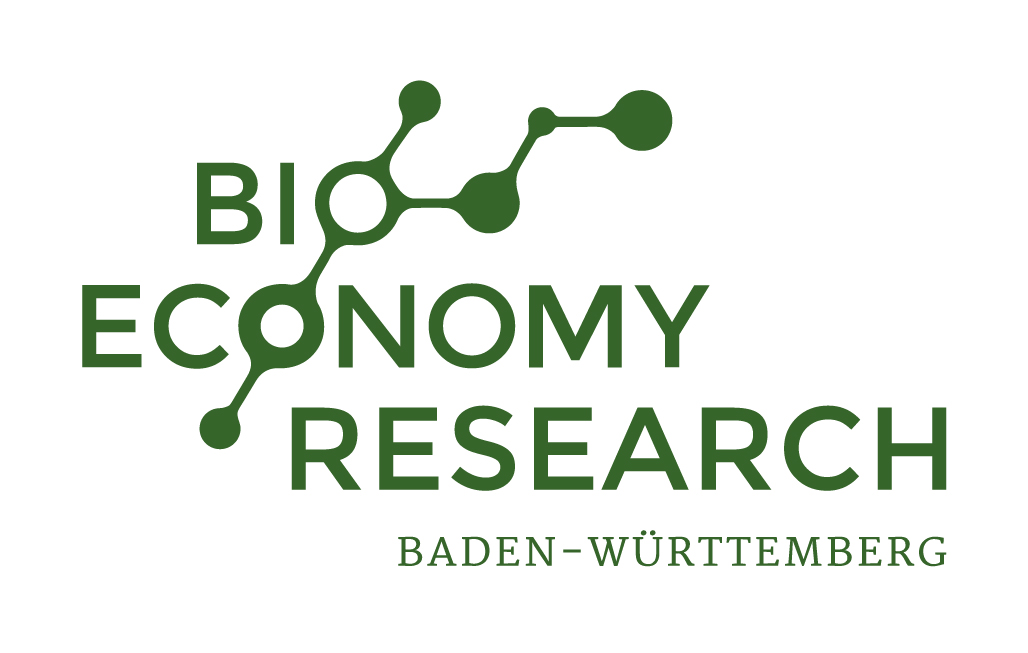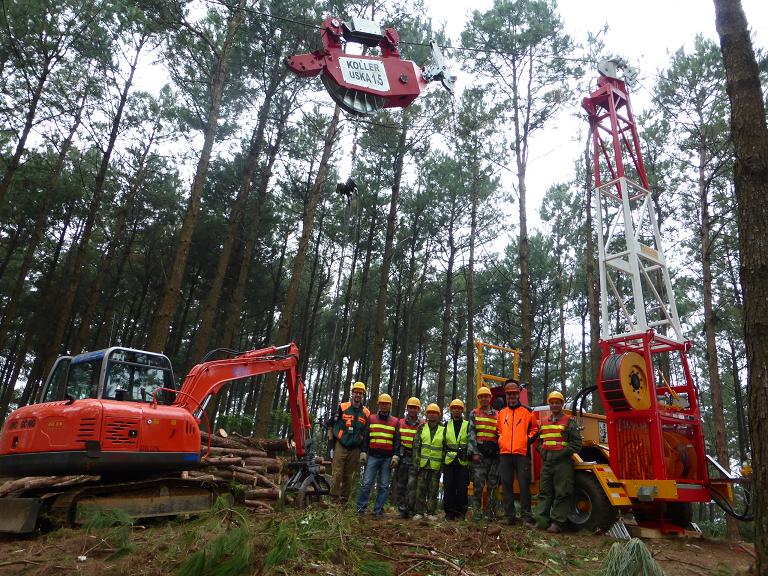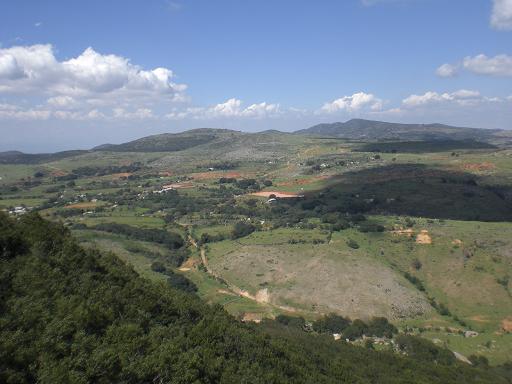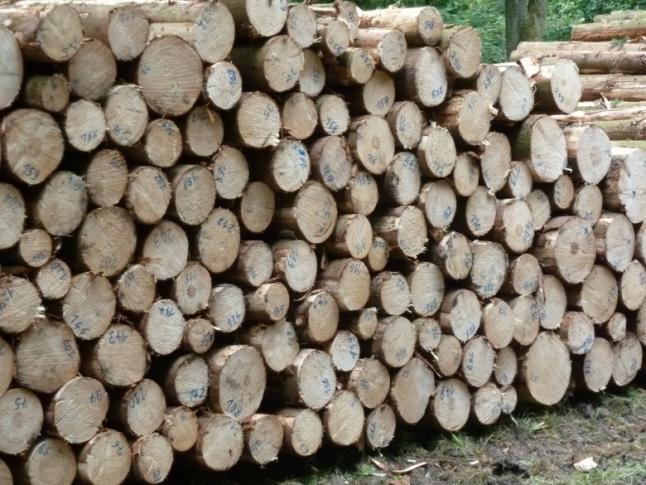Past Projects
Sensor-based optimization of oak wood drying
Drying of large dimensioned sawn oak wood timber can be done only by long drying times for several years at low temperatures. The reason for this mild drying process is the relatively high amount of parenchyma cells in the wood that collapses during drying, leading to crack formation and "honey comb" patterns. Hence, this project aims to design a gas-sensor prototype based on existing and investigated chemical knowledge of wood drying and wood degradation that enables faster oak wood drying by monitoring the emissions during drying. This concept can assess the risk for and, thereby, can allow the avoidance of crack and "honey comb" pattern formation. The influence of the drying process as a bottleneck can be decreased by adapting the drying temperature to the physiological state of the oak wood.
Project duration: 01.01.2016 until 31.12.2018
Funding: GFH Freiburg, Gesellschaft zur Förderung der forst- und holzwirtschaftlichen Forschung an der Universität Freiburg im Breisgau e.V.
Contact person: Dr. Sebastian Paczkowski
Scientific supervisor: Dr. Sebastian Paczkowski
Sampling of Emissions during storage and thermal combustion of wood pellets
Emissions from thermal combustion or storage of wood pellets are increasingly considered to have an impact on human health. This project investigates methods to decrease emissions from thermal combustion of pellets. Emission reduced pellets can increase the life time of filter systems, as less VOCs are emitted or improve the storage conditions by reducing toxic CO emissions. In order to reach this goal, thermally pretreated wood flakes should be tested for VOC and CO emissions.
Project duration: 01.01.2015 until 31.12.2017
Funding: GFH Freiburg, Gesellschaft zur Förderung der forst- und holzwirtschaftlichen Forschung an der Universität Freiburg im Breisgau e.V.
Contact person: Dr. Sebastian Paczkowski
Scientific supervisor: Prof. Dr. Dirk Jaeger
TC4LIFE: Low Impact Forest Management for Efficient and Sustainable Supply of Forest Resources and Ecosystem Services
Southeast Asia as an emerging region offers many opportunities for cooperation for German research and educational institutions. Within the framework of a "Travelling Conference" across three countries in Southeast Asia research networks were to be established and the local research infrastructure be investigated. In this conference current research topics have been presented, discussed and possible future research and work areas were identified and developed. The "Travelling Conference" intended to address an audience of scientists, private companys and political representatives of the partner countries.
The Travelling Conference "Low Impact Forest Management for Efficient and Sustainable Supply of Forest Resources and Ecosystem Services" was organized by the Chair of Forest Operations, University of Freiburg, Germany. The conferences were performed in cooperation with selected partners:
- Vietnam National University of Forestry, Hanoi, Vietnam
- Mulawarman University, Samarinda, Indonesia
- Forest Research Center Sabah in collaboration with Universiti Malaysia Sabah, Kota Kinabalu, Malaysia.
The German delegation consisted of six scientists from the University of Freiburg from the Chair of Forest Operations, Chair of Soil Ecology and Chair of Silviculture as well as two entrepreneurs of GISCON Systems GmbH and Open Forests UG.
Project duration: 01.10.2015 until 29.02.2016
Funding: German Federal Ministry of Education and Research
Contact person: Dr. Martin Brunsmeier
Scientific supervisor: Prof. Dr. Dirk Jaeger
REPLAN: Improved resource management in forestry by actual process times and process costs for common working processes
| The objectives of the project include the derivation, the development and if applicable the registration of process times and process costs for operation planning, monitoring and evaluation of selected forest operations. The selected forest operations should be of relevance for all parts of Germany. Within the project, a database is designed and created that will be available for use by forest owners, forest enterprises, forest advisers and forest entrepreneurs. Other key project tasks include the development of a concept for continuous data collection and update and the establishment of a longterm network of interested actors of forest industry for reporting on data and additional processes to be included in that database. By improving the cost consciousness, the efficiency in using forest resources will be enhanced benefitting actors in forestry and society as a whole. |
Project duration: 3 years
Funding: Federal Ministry of Food and Agriculture (BMEL), Specialist agency of renewable resources (FNR)
Contact person: Felix Rinderle
Scientific supervisor: Prof. Dr. Dirk Jaeger
SOLVE: Timber harvesting and transportation systems adapted to altered forest structures due to climate change
Within this project timber harvesting and transportation systems will be identified for adapted wood supply chains which are best adapted to climate induced changes of tree species composition and forests structures and management concepts with respect to environmental soundness and emissions.
Project duration: 3.5 years
Funding: Förderrichtlinie Waldklimafonds des Bundesministeriums für Ernährung, Landwirtschaft und Verbraucherschutz und des Bundesministeriums für Umwelt, Naturschutz und Reaktorsicherheit
Contact person: Janine Schweier
Scientific supervisor: Prof. Dr. Dirk Jaeger
 BioPotential - Regional availability of lignocellulose as a primary raw material for Baden-Württemberg: A contribution to capacity design, site selection and sustainable supply of raw materials for future biomass-based conversion plants.
BioPotential - Regional availability of lignocellulose as a primary raw material for Baden-Württemberg: A contribution to capacity design, site selection and sustainable supply of raw materials for future biomass-based conversion plants.
The state of Baden-Württemberg is promoting a research program on bio-economy and supports, among others, seven scientific projects at the University of Freiburg. With their approaches the researchers want to contribute to improvement of sustainable and economic use of renewable resources.
One objective therefore is to examine ways to provide woody biomass sustainably, whereby the needed production of trees and other woody plants shall promote biodiversity and ensure the preservation of ecosystems. Additionally, the scientists want to design a concept for biorefineries: These facilities will process lignocellulose into bio-based chemicals, materials and products. According to the approach the byproducts can also be used to create or produce food, feed energy. It is expected to use the biomass in its entirety and thus to increase the value and resource efficiency.
The subproject BioPotential is located within the research network lignocellulose-based value chains: all conversion processes have a specific - in terms of quantity and quality - demand for raw materials. Only if these can be provided at a reasonable cost and with minimal negative environmental impacts in the long run, the respective conversion concept is economically viable and can be sustainably realised. The aim of BioPotential is the conceptual development and exemplary implementation of a regionalised, quantitative analysis of potentials, availabilities and supply chains of lignocellulose as the primary raw material in order to find optimal locations for conversion facilities.
Project duration: 01.10.2014 – 30.09.2017
Förderung: Ministry for Science, Research and Art Baden-Württemberg
Contact: Dr. Marcus Lingenfelder
Project partners: Prof. Dr. Dirk Jaeger (Chair of Forest Operations), Prof. Dr. Gero Becker (Forest Utilization), Prof. Dr. Barbara Koch (Chair of Remote Sensing and Landscape Information Systems).
 Lin2Value: Innovative technologies and services in a sustainable and multifunctional land-use-system in China
Lin2Value: Innovative technologies and services in a sustainable and multifunctional land-use-system in China
 | This project aims to study the possibilities and methodological basis of new technologies and innovative approaches in the context of land use improvement, especially the management of forests in China. Multifunctional forest management can in diverse ways secure and improve the ecosystem services, such as water and erosion protection, contribute to carbon sequestration, and meanwhile increase the land use efficiency in terms of economic productivity. Furthermore, the efficient utilization of woody biomass is of special interest in terms of increasing the use of renewable resources for energy production. Innovative technologies for the measurement, harvest, wood-quality assessment and wood utilization will be analyzed. |
Possibilities for site-adapted production concepts for woody biomass will be analyzed and evaluated according to economic, ecologic and sustainability criterias.
The working package includes:
- Development of semi-mechanized harvesting systems under Chinese conditions, with special focus on cable yarding harvesting systems
- Development of concepts for the use of roundwood of smaller dimensions and bamboo for the production of secondary energy carriers, namely pellets
Project duration: March 2012 - September 2015
Funding: Bundesministerium für Bildung und Forschung (BMBF)
Contact person: Stephan Hoffmann
Website: www.lin2value.de
Scientific supervisor: Prof. Dr. Dirk Jaeger
RaLaReg: Automatic wheel load regulation for the improvement of soil protection
| Nowadays, many forestry machines use bogie axles. These axles are characterized by the attachment of the left and right pair of wheels to an oscillating gear, which is fixed to the vehicle frame. This enables a good cross-country mobility, especially during the crossing of obstacles or ditches. However, caused by the geometric properties of bogie axels, the drive torque creates shearing forces. This leads to a righting moment, limiting the constant contact of all wheels to the ground. Especially during high pulling forces and the trafficking of steep slopes, the righting moment is intensified and wheels can even take off the ground. In some circumstances the righting moment can be desirable, e.g. when passing an obstacle. This research study examines possibilities to counteract the righting moment depending on different driving situations, to enable equal ground contact of the bogie axels and to improve the soil protection and traction. |
Project duration: June 2013 - June 2015
Funding: Cluster Forst und Holz Baden-Württemberg
Contact person: Florian Schnaible
Scientific supervision: Prof. Dr. Dirk Jaeger
Socioeconomic and Environmental Assessment on the sizing of a Biomass Power Plant for the Rural Development in Mexico
 | This project aims to develop a methodology for holistically evaluating the feasibility of decentralized bioenergy plants for lignocellulose forest biomass. This includes the creation of regional energy supply chains, which support sustainable development of rural communities. A forest biomass utilization analysis, economic feasibility of the Forest Wood Chain changes and a characterization and evaluation of social driving forces are adressed as well. Furthermore the assessment of the proposed alternatives are evaluated by the Tool for Sustainability Assessment. |
Project duration: January 2014 - September 2017
Funding: German Academic Exchange Service (DAAD)
Contact person: Ulises Flores
Scientific supervision: Prof. Dr. Dirk Jaeger
Derivation of a qualified forest control measure for sawlog assortments and the integration of log pile assessment methods into wood supply chains
| The goal of this study was to evaluate the accuracy of harvester data collected by harvesting machinery following the new established calibration procedure and analyze the potential use of derived mean log volumes per assortment and photo-optical log scaling methods to allow for automatic estimation of log pile volumes at the landing and thus overcome the rupture of the information flow. Project duration: since 2013 Contact persons: Martin Opferkuch , Siegmar Schönherr Scientific supervision: Prof. Dr. Dirk Jaeger |
Analysis of strenous body postures and work movements at the motor manual harvest of large dimensional broadleave trees
| The study analyzes the ergonomics of motor manual felling and processing of large-dimensional broadleave trees in Baden- Württemberg. Two common methods for the optical analysis and evaluation of strenous body postures and work movements were used: Ovako Working-postures Analysis System (OWAS) and Rapid Upper Limb Assessment (RULA). Both methods were compared and evaluated in regard to their analyzation effort and the identification approach of strenous body postures. The single cycle elements were analyzed for the intensity and duration of strenous body postures. Aditionally, the individual stress of the workers was analyszed using heart rate monitors and questionaires. |
Project duration: since 2012
Contact person: Siegmar Schönherr
Scientific supervision: Prof. Dr. Dirk Jaeger
Optimization of timber logistics in Baden Württemberg
Picture: AGR, 2013 | Project duration: since 2014 Funding: Cluster Forst Holz Contact persons: Dr. Thomas Smaltschinski, Scientific supervision: Prof. Dr. Dirk Jaeger |
Soil damages caused by trafficking of harvesters and forwarders
| The highly mechanized timber harvesting using harvesters and forwarders in moderate terrain has gained increased importance in the last decades in Atlantic Canada. This study examines the impact of both forest machines on the soil when trafficking in two forest stands in New Brunswick (Canada). Within the experiment the impact of trafficking on soil bulk density and the persistence of soil over a long-term period are measured. The periodic density measurements are assessed by using a nuclear moisture and density gauge, which does not require the extraction of samples. The density measurements are conducted annually since 2005 with varying trafficking intensities and brush mattress thickness. |
Project duration: since 2005
Funding: NBIF, NSERC
Contact person and scientific supervision: Prof. Dr. Dirk Jaeger
Integration of firebed temperature in a concept for the emission reduction in small-scale biomass furnaces (COFIT - Controlled Firebed Temperature)
The main measure involves the specific influence of the firebed temperature on the reduction of emissions of particulate matter from small-scale biomass furnaces. Additionally secondayr measures are applied to significantly lower the emission of particles.
Funding: Deutsche Bundesstiftung Umwelt (DBU), KWB Deutschland - Kraft und Wärme aus Biomasse GmbH
Contact person: Matthias Gehrig (Hochschule Rottenburg)
Scientific supervision: Prof. Dr. Dirk Jaeger (first advisor), Prof. Dr. Stefan Pelz (second advisor)
ADVISORY COMMITTEE
Spatially modelling forest trafficability with ForHym and LiDAR-based cartographic depth-to-water
The thesis proposal deals with mapping weather-affected changes in soil moisture over time. This is to visualize where and when soils would be subject to severe rutting and compaction under forest operations. The approach taken is modular by connecting temporal hydrothermal processes dealing with soil wetting, drying, freezing, and thawing to spatially anticipated locations of dry versus wet soil drainage conditions. The temporal variations within specific textured soils can be modeled at daily resolution based on air temperature, and precipitation (rain, snow) data. This is done with the Forest Hydrology Model (ForHyM). The spatial variations can be derived from LiDAR-generated bare-ground elevation surfaces at 1 m resolution by way of the newly developed metric depth-to-water index (DTW), for which DTW < 10 , 10–25, 25-50, 50-100, > 100 cm indicates very poor, poor, imperfect, moderately well and well drainage conditions, respectively. The results of doing so will be illustrated for forested areas in Northern and Central New Brunswick in reference to actual forest harvesting and wood forwarding tracks. The attempt is to generalize the methodology for weather-dependent and geospatially base forecasting of soil conditions to better enable forest operation planning as seasons change from dry to wet and from wet to dry within seasons and from year to year.
Project duration: seit 2013
Contact person: Marie-France Jones (University of New Brunswick)
Scientific supervision: Paul A. Arp., PhD (Supervisor), Jasen Golding (Supervisor), Prof. Dr. Dirk Jaeger (Committee Member)


